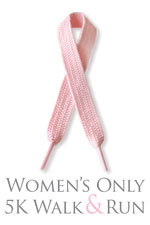Recently, my wife and several of her friends participated in The Women’s Only 5K Walk and Run to support the fight against Breast Cancer. It was a wonderful event with over 3000 participants, and my wife posted a very impressive time, finishing in the top 8%. As many of you know, she is a Breast Cancer Survivor, so anything that benefits the fight against this horrible disease is near and dear to our hearts.
During the post run festivities the conversations of many of the participants got me to thinking about, of all things, the teachings of the Eastern Orthodox Church regarding the sacramental nature of creation and life. I know some reading this are probably thinking to themselves, “What? How do you make that connection?”, but bear with me for a second. As you may suspect, many of the racers were talking about how wonderful it was to join in the fight against breast cancer. Some likened their struggle to finish the race as quickly as possible (or even at all) to the struggle of those going through chemotherapy, radiation, surgery, etc. While the run does raise money for breast cancer research, it was evident from those around me that their participation was about much more than raising money. If it was only about the money, they easily could have sent their checks and left it at that. However, they chose to run in the race. They chose to take action and become physically involved, because what they truly wanted was to participate in the struggle. Essentially, they felt that by participating in the race they were in some way joining alongside those fighting against cancer. The act of running and pushing themselves and their emotional resolve and physical exertion was their way of fighting against the disease.
In many respects, this idea of participation is in line with the Orthodox approach to life as sacramental. In Orthodoxy, Sacraments, which are more properly called Mysteries from the Greek word Mysterion, are a special means of participating in the Divine Grace and Life of God. While the Church recognizes seven Holy Mysteries – Baptism, Chrismation, Eucharist, Confession, Holy Unction, Marriage, and Ordination – she by no means limits the Mysteries to only seven. Instead, the Orthodox Church considers all of life to be sacramental. When God created the world, He called it good, and He gave it to us as a means and vehicle of communing with Him and with one another. After the fall, man began to view the world as an end in itself or as a means to achieving something other than communion with God. After all, seeing food as a means to a selfish end (Genesis 3:7) was at the heart of the fall. However, in the Incarnation, God Himself, in the Second Person of the Trinity, took on material creation, becoming man, and sanctified it. Creation can once again be used as a vehicle and means of communing with God, and, as a result, with each other. When we go out to dinner with a friend, the food and drinks that we share can be sacramental. Through the act of eating and drinking we can commune with one another, and, if viewed properly, with God. When we play a game of golf or cards with friends, the game itself can be sacramental. Through it we can grow closer to one another, participate in one another’s life, and, again, if viewed properly, with God.
The Sacramental Approach to life and creation can transform ones view of creation. Rather than holding a fragmented view of the world, creation and matter can be understood more holistically, as the gift they truly are. Food is no longer something used merely to fill our stomachs or give us pleasure. Instead, it is a means of bringing people together in communion with their Creator. A game of cards or golf is no longer simply a time of pleasure. It is a time of union with ones fellow-man and communion with the Holy Trinity. Likewise, a run with friends to raise money for the fight against Breast Cancer can be an act of true participation in the struggle of others, and, in many ways, as participation in the Life of God as we help those around us fight a horrible disease.
